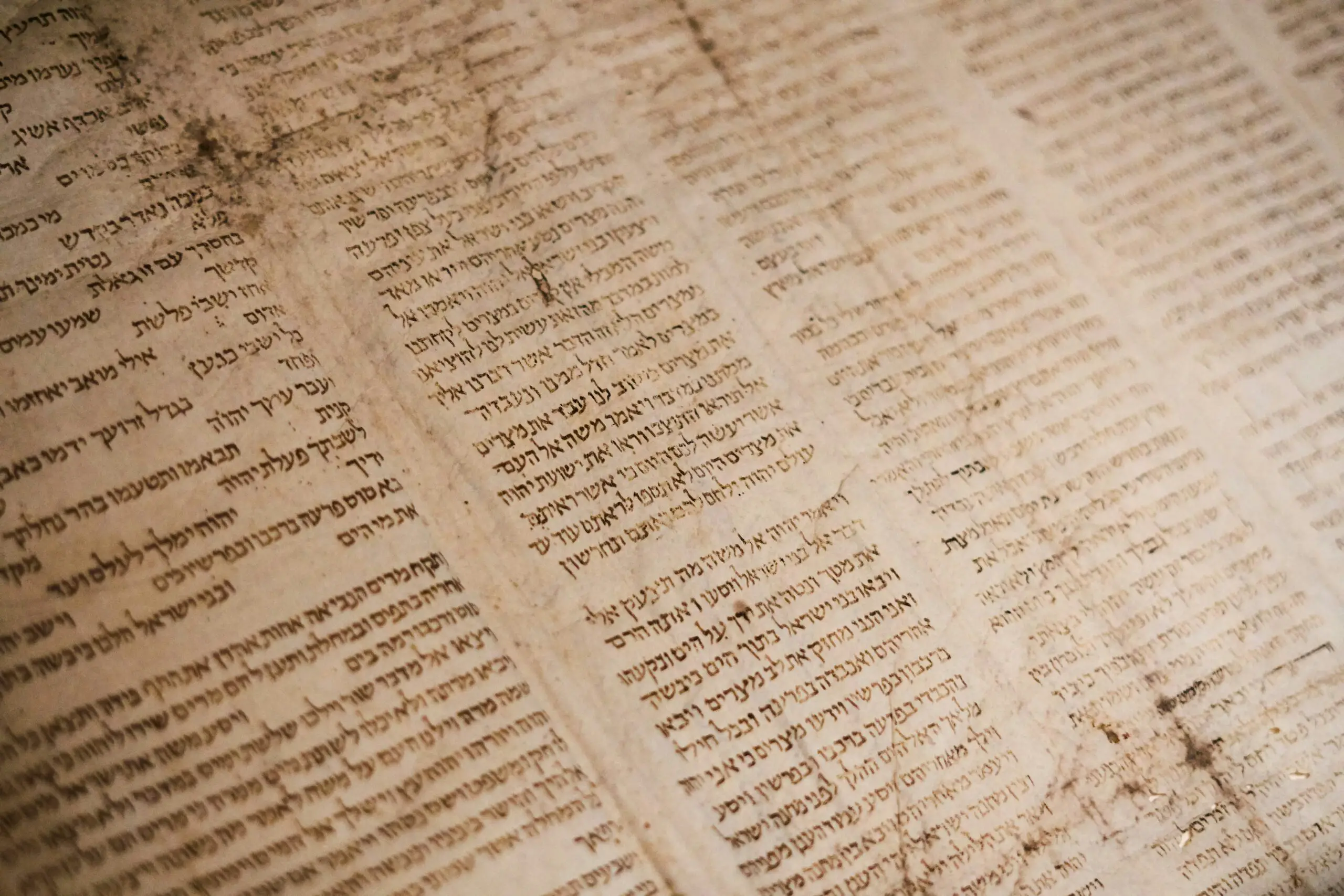Want to learn the Hebrew Bible in it’s original language? This Biblical Hebrew word list contains over 300 of the most frequent terms found within the Hebrew Bible. It is organized into the following categories: nouns, adjectives, prepositions, and verb roots. Each of the words are translated into English based on its Ancient Hebrew meaning. With the exception of the verb roots, I have also provided and English transliteration.
The Biblical Hebrew Word List
***Want to download this Ancient Hebrew Vocabulary List. Get the Free PDF below. No sign up required!
Nouns
אב (av): father
אבן (even): stone
אדון (adon): lord, master
אדם (adam): man, human
אהבה (ahava): love
אוזן (ozan): ear
אוכל (ochel): food
אור (or): light
אח (ach): brother
אחות (achot): sister
איש (ish): man, person
אישה (isha): woman, wife
אלו–הים (e-lohim): God
אם (em): mother
אמא (ima): mother
אמת (emet): truth
אף (af): nose
ארץ (eretz): land, earth
אש (esh): fire
באר (b’eir): well of water
בוגד (bogeid): traitor
בור (bor): pit
בית (bayit): house, home
בן (ben): son
ברזל (barzel): iron
בשר (basar): meat
בת (bat): daughter
גיבור (gibor): a hero, strong person
גמל (gamal): camel
גן (gan): garden
גפן (gefen): vine
גשם (geshem): rain
דבר (devar): word, matter, thing
דבש (davash): honey
דג (dag): fish
דלת (delet): door
הר (har): mountain
זהב (zahav): gold
זית (zayit): olive
זמן (zeman): time
חבר (chaver): friend
חג (chag): holiday
חדר (cheder): room
חום (chom): heat
חושך (choshech): darkness
חטא (cheit): transgression
חיטה (chita): wheat
חייל (chayal): soldier
חכם (chacham): wise man
חכמה (chochma): wisdom
חלב (chalav): milk
חלום (chalom): dream
חלון (chalon): window
חמור (chamor): donkey
חץ (chetz): arrow
חרב (cherev) – sword
טוב (tov): good
יד (yad): hand
יום (yom): day
יין (yayin): wine
ים (yam): sea
ירח (ya-re-ach): moon
ירך (yerech): thigh
ירקות (yerakot): vegetables
כהן (kohen): priest
כוכב (kochav): star
כיסא (kisey): chair
כסף (kesef): silver
כעס (ka’as): anger
כפר (kfar): village
לב (lev): heart
לחם (lechem): bread
לילה (layla): night
מגן (magen): shield
מדבר (midbar): desert
מחול (machol): dance
מחלה (machla): ailment
מיטה (mitah): bed
מַיִם (mayim): water
מכתב (mikhtav): letter
מלח (melach): salt
מלך (melech): king
מלכה (malka): queen
מקום (makom): place
משפחה (mishpacha): family
נבון (navon): understanding
נביא (navi): prophet
נהר (nahar): river
נחושת (nechoshet): copper
נפש (nefesh): soul
סוס (sus): horse
ספר (sefer): book
עבד (eved): servant, slave
עבודה (avoda): work
עוול (avel): injustice
עונש (onesh): punishment
עין (ayin): eye
עיר (ir): city
עם (am): people, nation
עני (ani): poor person
ענן (anan): cloud
עץ (etz): tree
עצב (etzev): sadness
עשן (ashan): smoke
פה (pe): mouth
פחד (pahad): fear
פרה (parah): cow
פרי (pri): fruit
צדק (tzedek): justice
קול (kol): voice, sound
קשת (keshet): bow
ראש (rosh): head
רגל (regel): foot, leg
רוח (ruach): spirit, wind
רע (ra): bad
שבט (shevet): tribe
שדה (sadeh): field
שולחן (shulchan): table
שופט (shofet): judge
שופר (shofar): trumpet from a ram’s horn
שוק (shuk): market
שיר (shir): song
שלג (sheleg): snow
שמחה (simcha): joy
שמים (shamayim): sky, heaven
שמן (shemen): oil
שמש (shemesh): sun
שׂנאה (sin’a): hate
שנה (shana): year
שעה (sha’a): hour
שעורה (se-ora): barley
שפה (safah): language
שקר (sheker): lie
שתיקה (shtika): silence
תורה (torah): law, teaching
Adjectives and Descriptive Words
אדום (adom): red
איטי (iti): slow
אכזרי (ach-zari): cruel
אמיץ (amit’z): brave
אמיתי (emiti): true
ארוך (aruch): long
אשם (ashom): guilty
בהיר (behir): bright
בוגד (boged): treacherous
בזוי (bazui): despised
בטוח (batach): confident
בריא (bri’a): healthy
גאה (ge’eh): proud
גבוה (gavoah): high, tall
גדול (gadol): great, large
חביב (chaviv): dear, beloved
חדש (chadash): new
חולה (chola): sick
חזק (chazak): strong
חכם (chacham): wise
חלש (chalash): weak
חם (cham): hot
חמוץ (chamutz): sour
חרוץ (charutz): diligent
חשוך (chashuch): dark
טוב (tov): good
טיפש (tipesh): foolish
טמא (ta-meh): impure
טעים (ta’im): delicious
יבש (yavash): dry
יהיר (yahir): arrogant, haughty
יפה (yafeh): beautiful, pretty
ירוק (yarok): green
ישן (yashan): old
כבד (kaved): heavy
כועס (ka’as): angry
כחול (kachol): blue
לבן (lavan): white
מהיר (mahir): fast, quick
מכובד (mechubad): respected
מכוער (mechu’ar): ugly
מלא (male): full
מלוח (malu’ach): salty
מלוכלך (melukalach): dirty
מסופק (mesupak): doubtful
מסריח (masriach): smelly
מעט (me’at): little, few
מר (mar): bitter
מתוק (matok): sweet
נאמן (ne’eman): faithful
נדיב (nadiv): generous
נמוך (namukh): low, short
נקי (naki): clean, innocent
עוין (oyev): hostile
עניו (ani’v): humble
עצוב (atzev): sad
עצלן (atzelan): lazy
פחד (pahad): afraid
פחדן (pachdan): cowardly
צדיק (tzadik): righteous, just
צהוב (tsahov): yellow
צנוע (tsanu’a): modest
צר (tsar): narrow, tight
קדוש (kadosh): holy
קטן (katan): small, little
קל (kal): light
קמצן (kamtzan): stingy
קצר (katzar): short
קר (kar): cold
קשוח (kashu-ach): harsh
רב (rav): much, many
רועש (ro’ash): loud
רחב (rachav): wide, broad
רחום (rachum): merciful
רטוב (ratuv): wet
ריחני (richani): fragrant
ריק (rik): empty
רע (ra): bad
רשע (rashah): wicked
שחור (shachor): black
שמח (sameach): happy
שנוא (s’nuah): hated
שקט (shaket): calm, peaceful
שקרן (shekaran): deceptive
תמים (tamim): simple, innocent
Prepositions
בְּ (b’): indicating location, instrument, manner, etc.
אֶל (el): towards, to
עַל (al): on, upon, over
לְ (l’): to, for, towards
מִן (min): from, out of, since
בֵּין (beyn): between, among
כְּ (k’): like, as
אֶת (et): the definite article
עִם (im): with
תַּחַת (tachat): under, beneath
בְּלִי (bli): without
אַחַר (achar): after, behind
כְּמוֹ (kmo): like, as
מִלִּפְנֵי (mi-lifney): from before, from the presence of
עַד (ad): until, to
Verb Roots
Note: In Hebrew every verb is based on a 3 or 4 consonant root called a shoresh (שורש). These letters are the building blocks around which vowels are placed to form a complete word.
These roots are divided into 3 types: Strong, Weak and Hollow. Strong roots have all letters appear in all conjugations. Weak roots have letters that disappear in some conjugations. These letters are called weak letters. The weak letters are: א alef, ע ayin, ה heh, ח chet, י yod, ו vav, and נ nun. Hollow verbs are verbs in which the second root letter is a (ו ) vav or a (י ) yod which disappear in conjugation.
אכל: to eat
אמר: to say
אנן: to complain
אפה: to bake
בא: to come
בטח: to promise
בכה: to cry
בנה: to build
ברה: to create
בשל: to cook
גלה: to discover
גנב: to steal
דאג: to worry
דבר: to speak
הביא: to bring
הבין: to understand
היה: to be
הלך: to go, walk
סתר: to hide
נצל: to save, rescue
הרג: to kill
הרס: to destroy
השתדל: to try
זכר: to remember
חג: to celebrate
חזר: to return
חיה: to live
חלק: to distribute
חפץ: to desire
חפר: to dig
חקק: to engrave
חשב: to think
ידע: to know
יצא: to go out
ירד: to go down
ישב: to sit
ישן: to sleep
כעס: to be angry
כתב: to write
ללמד: to learn
למד: to teach
מכר: to sell
מת: to die
נכנס: to enter
נסע: to travel
נפל: to fall
נתן: to give
סגר: to close
סלח: to forgive
עזר: to help
עלה: to go up
עמד: to stand
ענה: to answer
עף: to fly
עשה: to do
פגע: to meet
פחד: to fear
פתח: to open
צחק: to laugh
צייר: to draw
קח: to take
קנה: to buy
קרא: to call
ראה: to see (ראה, ראיתי, תראה)
רקד: to dance
שאל: to ask, borrow
שח: to swim
שכח: to forget
שמח: to rejoice
שמע: to hear
שמר: to guard
שר: to sing
שתי: to drink





